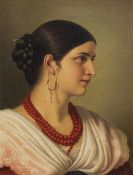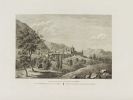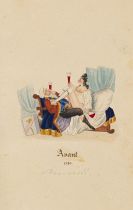
Wilhelm von Humboldt
Potsdam
1767 -
Berlin
1835
Friedrich Wilhelm Christian Carl Ferdinand Baron von Humboldt, in short Wilhelm von Humboldt, was born as the son of an officer in Potsdam on June 22, 1767. Wilhelm von Humboldt was one of the great scholars in German cultural history and co-founder of the University of Berlin.
Wilhelm von Humboldt was taught by private tutors, including Joachim Heinrich Campe. He studied natural sciences and languages, received an introduction to political science and philosophy, and read the main texts of Gottfried Wilhelm Baron von Leibniz.
Wilhelm von Humboldt attended the University of Göttingen, where he studied classical languages and natural sciences under Georg Christoph Lichtenberg and studied the works of Immanuel Kant. In summer 1789, together with Campe, Humboldt traveled to revolutionary Paris, visited Rhineland and Switzerland.
In early 1790 Wilhelm von Humboldt entered the Prussian civil service in Berlin and became a "Legionatsrat" and junior lawyer. In May 1791 he left the civil service by his own will and got married in June that year. In the following years he lived on his wife's family property in Thuringia, where he came into close contact with Goethe and Schiller.
Three years later he went to Jena, became a critical adviser and co-worker of Schiller and later also of Goethe. Schiller and Goethe welcomed his creative criticism as a constructive contribution which furthered their work.
In late 1797 he moved to Paris with his family. >From 1803 to the end of 1808 Wilhelm von Humboldt was the Prussian "Ministerresident" at the Holy See in Rome. During this time he studied Basque and native American languages and translations from Greek. Humbolt's residence in the Villa Gregoriana became a meeting point for artists and scholars. After the collapse of Prussia, he returned to Germany, where he took on the Department of Culture and Education at the Prussian Ministry of the Interior.
In this position Wilhelm von Humboldt lead the fundamental reform, which resulted in the establishment of a general and continuous educational system reaching from elementary school to university.
In 1811 he was sent to Vienna as an envoy and brought about the entry of Austria into the coalition against Napoleon. At the Congress of Vienna, Wilhelm von Humboldt participated in the negotiations for the first and second Paris Peace Treaties, where he successfully fought for the rights of Jewish citizens, but failed to reach anything with regard to a liberal constitution for the German Federation. He participated there as second plenipotentiary of Prussia and from 1815 to 1819 he was the Prussian plenipotentiary in the parliament in Frankfurt am Main, chairman of the commission for tax reform and the Prussian envoy to London.
In 1819 he returned to Berlin as Minister of Class Issues, but due to his resistance against the Carlsbad Decree and his attempt to pass a liberal constitution for Prussia, he was removed from all his offices in 1819. Subsequently, Wilhelm von Humboldt retreated to the family residence in Tegel, in 1828 he traveled to Paris and London and dedicated the rest of his life to the study of linguistics.
Wilhelm von Humboldt died in Berlin-Tegel on April 8, 1835.
Would you like to sell a work by Wilhelm von Humboldt?
Infos for seller












